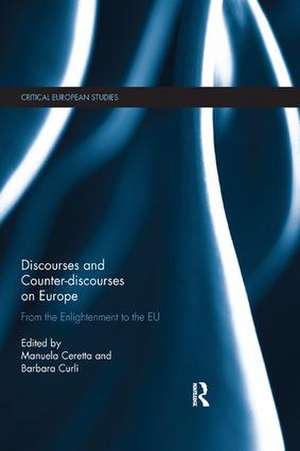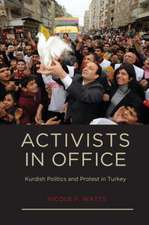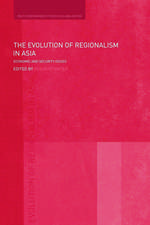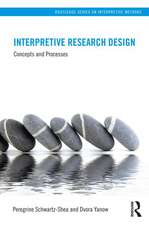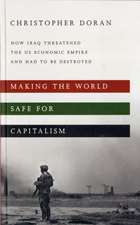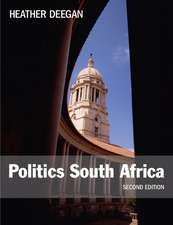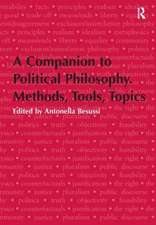Discourses and Counter-discourses on Europe: From the Enlightenment to the EU: Critical European Studies
Editat de Manuela Ceretta, Barbara Curlien Limba Engleză Paperback – 17 ian 2019
This text will be of key interest to scholars and students of European Union politics, European integration, European History, and more broadly international relations.
| Toate formatele și edițiile | Preț | Express |
|---|---|---|
| Paperback (1) | 409.73 lei 6-8 săpt. | |
| Taylor & Francis – 17 ian 2019 | 409.73 lei 6-8 săpt. | |
| Hardback (1) | 1062.98 lei 6-8 săpt. | |
| Taylor & Francis – 19 ian 2017 | 1062.98 lei 6-8 săpt. |
Preț: 409.73 lei
Nou
Puncte Express: 615
Preț estimativ în valută:
78.40€ • 82.08$ • 64.87£
78.40€ • 82.08$ • 64.87£
Carte tipărită la comandă
Livrare economică 05-19 aprilie
Preluare comenzi: 021 569.72.76
Specificații
ISBN-13: 9780367173708
ISBN-10: 0367173700
Pagini: 284
Ilustrații: 14 Line drawings, black and white; 2 Halftones, black and white; 7 Tables, black and white; 16 Illustrations, black and white
Dimensiuni: 156 x 234 x 15 mm
Greutate: 0.3 kg
Ediția:1
Editura: Taylor & Francis
Colecția Routledge
Seria Critical European Studies
Locul publicării:Oxford, United Kingdom
ISBN-10: 0367173700
Pagini: 284
Ilustrații: 14 Line drawings, black and white; 2 Halftones, black and white; 7 Tables, black and white; 16 Illustrations, black and white
Dimensiuni: 156 x 234 x 15 mm
Greutate: 0.3 kg
Ediția:1
Editura: Taylor & Francis
Colecția Routledge
Seria Critical European Studies
Locul publicării:Oxford, United Kingdom
Public țintă
Postgraduate and UndergraduateCuprins
Introduction: Rescuing Europe from its Rhetoric
Part I: Thinking and Regretting Europe
Introduction to Part I
1. Thinking Europe in the Age of Enlightenment: philosophes and antiphilosophes between Universalism and Fragmentation
2. Evoking Europe against the French Revolution: the Rhetorical Tools of Counter-revolutionary Thinkers
3. Discourses on Europe and their Political Value in Restoration France
Part II: The Burden of Rhetoric: inside the European Institutions
Introduction to Part II
4. A European Framework for Military Institutions? International Integration and European Perspectives in Military Rhetorics after the Second World War
5. Nuclear Europe: Technoscientific Modernity and European Integration in Euratom’s Early Discourse
6. Parliamentary Groups and Political Traditions in the Debates on EU Institutional Reform (1979-1999)
7. The Political Groups of the European Parliament in the Face of Yugoslavia's Disintegration and the Discursive Framing of EU Foreign Policy (1991-1995)
Part III: Communicating Europe
Introduction to Part III
8. The Alter-globalist Counter-discourse in European Rhetoric and Translation: Women’s Rights at the European Parliament
9. Europe in the Media Space: The Construction of the EU Public Sphere in Italy
10. ISIS’ Dabiq Communicative Strategies, NATO and Europe: Who is Learning from Whom?
11. Changing Perceptions of the European Union in the MENA Region before and after the Arab Uprisings: the Case of Tunisia
Part I: Thinking and Regretting Europe
Introduction to Part I
1. Thinking Europe in the Age of Enlightenment: philosophes and antiphilosophes between Universalism and Fragmentation
2. Evoking Europe against the French Revolution: the Rhetorical Tools of Counter-revolutionary Thinkers
3. Discourses on Europe and their Political Value in Restoration France
Part II: The Burden of Rhetoric: inside the European Institutions
Introduction to Part II
4. A European Framework for Military Institutions? International Integration and European Perspectives in Military Rhetorics after the Second World War
5. Nuclear Europe: Technoscientific Modernity and European Integration in Euratom’s Early Discourse
6. Parliamentary Groups and Political Traditions in the Debates on EU Institutional Reform (1979-1999)
7. The Political Groups of the European Parliament in the Face of Yugoslavia's Disintegration and the Discursive Framing of EU Foreign Policy (1991-1995)
Part III: Communicating Europe
Introduction to Part III
8. The Alter-globalist Counter-discourse in European Rhetoric and Translation: Women’s Rights at the European Parliament
9. Europe in the Media Space: The Construction of the EU Public Sphere in Italy
10. ISIS’ Dabiq Communicative Strategies, NATO and Europe: Who is Learning from Whom?
11. Changing Perceptions of the European Union in the MENA Region before and after the Arab Uprisings: the Case of Tunisia
Notă biografică
Manuela Ceretta is Professor of History of Political Thought at the University of Turin, Italy. She is a member of the Scientific Board of Studi Irlandesi, A Journal of Irish Studies and of the Editorial Board of Storia del Pensiero politico.
Barbara Curli is Professor of Contemporary History and Global History at the University of Turin, Italy. She was Jean Monnet Chair in History of European Integration at the University of Calabria, Italy, and Fulbright Distinguished Chair in Italian History at Georgetown University, USA; and Editor-in-chief (2011-2014) of Il Mestiere di storico .
Barbara Curli is Professor of Contemporary History and Global History at the University of Turin, Italy. She was Jean Monnet Chair in History of European Integration at the University of Calabria, Italy, and Fulbright Distinguished Chair in Italian History at Georgetown University, USA; and Editor-in-chief (2011-2014) of Il Mestiere di storico .
Descriere
The book contributes to the ongoing process of "rethinking" the European project, identity, and institutions, brought about by the end of the Cold war and the current economic and political crisis. Starting from the principle that the present European crisis goes hand in hand with the crisis of its hegemonic discourse, the aim of the volume is to rescue the complexity, the richness, the ambiguity of the discourses on Europe as opposed to the present simplification.
